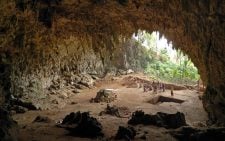Working without salary pays off for wildlife ranger

Undertaking nature conservation in hostile environment, and at times, without salary and supporting game ranger teams using own resources, is no mean feat.
But going above and beyond the call of duty to protect wildlife and support local communities is what led Daniel Popote Sapulai, Operation Commander Big Life Foundation, Kimana Sanctuary in Amboseli to win International Ranger Awards 2022.
Sapulai emerged among the top 10 from a pool of 113 nominations across 43 countries. The recognition comes with Sh1.2 million ($10,000) cash award.
Sapulai, 39, was recognised for his conspicuous dedication to protecting and conserving nature at Kimana Sanctuary, Amboseli area and fostering strong community relations.
A member of the local community, living a few kilometres from Amboseli National Park, Sapulai has been a ranger for 19 years.
His leadership and courage in tackling wildlife poaching in Kimana ecosystem has been exceptional. Judges said he demonstrated courage and diplomacy in peacefully resolving conflicts between communities and wildlife.
“My community have learnt that keeping wildlife safe is keeping their sons and daughters of the soil high globally,” a jubilant Sapulai said during the award ceremony at the International Union for Nature (IUCN) Africa Protected Areas Congress(APAC)in Kigali, Rwanda.
“I’m grateful for this award. This is a win for all of us. It’s a clear indication that the work of rangers is recognised,” he shared.
Sapulai notes that rangers are fundamental to the security of the globe’s protected and conserved areas. Their work is vital yet most of the times it goes unrecognised.
Gaining interest
Rangers risk their lives, live under difficult conditions, and spend long, arduous hours on the field to protect wildlife and secure protected areas.
For Sapulai and team, it has not been an easy ride. He says patience and discipline has finally paid off.
Sapulai recalls how he couldn’t further his education due to lack of school fees, but his passion for wildlife conservation continued to shine.
“Every time I came across the Kenya Wildlife Service (KWS) rangers patrolling while herding our cattle, I would give them information of animal carcasses. They used to educate me on the importance of reporting such wildlife cases. When I saw people with torches at night inside the nearby Amboseli National Park, I used to report it to the rangers,” says the wildlife ranger. He also reported about any unhealthy or sick animal case in the park. He would later become their informer.
In 2003, he immersed fully into the world of conservation after getting attached to Africa Safari Club Company-then the managers of Kimana Sanctuary.
The closure of Africa Safari Club in 2009, spelt doom for Sapulai and his team. They would remain jobless for seven years with little to write home about.
Against all odds
Sapulai and his team, undeterred, continued to conserve Kimana Sanctuary ecosystem busting illegal poaching activities, charcoal burning and illegal grazing inside the sanctuary.
Working without pay, he used his resources to lead a team in conserving the sanctuary.“As the team leader, I used to encourage my team not to give up on keeping Kimana Sanctuary safe because it’s an attactive place with a lot of wildlife,” he narrates.
For a period of four years between 2010 to 2014, Big Life Foundation took over the management of the sanctuary. The following year Olive Branch Company took over and leased the sanctuary for 25 years, but they could only survive for four years.
Luckily, Big Life Foundation would later bounce back in 2018 to continue with the sanctuary’s management.
Today, his determination to conserve wildlife in Kimana ecosystem, has seen him command 36 rangers in six different ranger outposts within the sanctuary.
Community-based approaches to poaching
Illegal wildlife trade and poaching activities is a major threat to species survival. In Kimana for example, Sapulai has employed the use of informers in tackling poaching activities.
His team has also adopted community-based approaches to promote conservation. The approaches, he notes, are aimed at raising awareness of the importance of conservation among people living in areas neighbouring the sanctuary.
Poaching activities have reduced tremendously within the 5,700 acres sanctuary in the heart of the Amboseli ecosystem.
Sapulai says conservation is clearly working. “I knocked on each Maasai bomas (homestead) to educate them on the impacts of conserving wildlife. I also used those reformed poachers as my informers and that has helped stop the activities completely. We have not reported incidents of poaching in Kimana sanctuary for many years,” he said.
And on human-wildlife conflicts, he notes that timely response is key.
“We are quick to respond to any report of wildlife raiding farms as well as staying with the farmers at night keeping vigil. When wild cats kill a domestic animal, we must be there on time to stop the local community from revenging by killing the animal and inform them that compensation would be done,” he adds.
Kenya’s recent and first wildlife census in 2021 showed that the number of elephants has increased from 16,000 in 1989 to 36,288-the highest proportion of which are in Tsavo ecosystem.
Amboseli has 1,900 alone, close to Maasai Mara’s 2,500.
This rebound in numbers, says Sapulai, is as a result of community conservation efforts and support from non-governmental organisations to deal with poaching through monitoring and enforcement.
He adds that the ongoing drought, and, perhaps most urgent, the ravaging effects of climate change are accelerating habitat loss and might spur poaching in the region.
Sapulai’s passion for conserving wildlife led him to near-death battles with poachers. From 2011 to 2014, there was a high numbers of poachers around Kimana sanctuary boundaries.
“I remember how one time we came across poachers who killed an elephant, they were armed to the teeth and the rangers had nothing but, our bare hands. Using the tactics we gain from local training, together with my team, we managed to recover the tusks,” he says.
The ranger plans to use the prize money to further support conservation work at the sanctuary.
Sapulai who has two wives and eight children says,“I believe charity begins at home. I teach my children on the importance of wild animals. They know they get their school fees through this work of protecting animals and I believe that in they teach their fellow students,” he shares.
Sapulai says that although progress has been made on nature conservation, we must sustain the fight.
“We must conserve for today and the future. When I finally retire, I want to see the wildlife population growing and poaching reduced to zero,” he says in ending.














